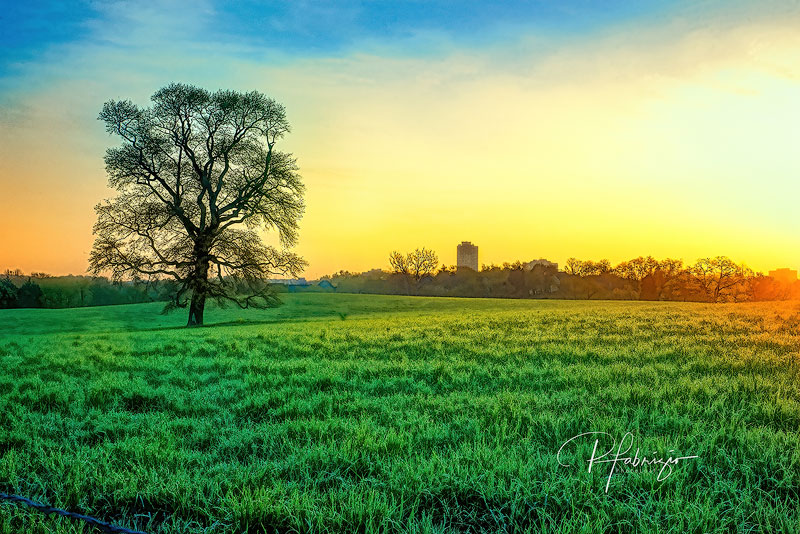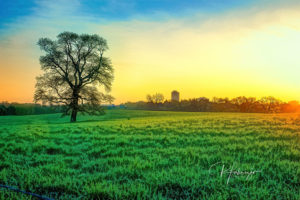
Ode to the Belward Farm Black Gum Tree
I was recently asked to find an old photo. Specifically, it was of “that tree” that stands on the former Belward Farm on the outskirts of Gaithersburg. It’s a black gum tree.
Back on Earth Day, April 22, 2013, I along with Sonya Burke met on the banks of the barbed wire Belward farmland adjacent to Muddy Branch Road. There we gathered to catch the trees’ silhouette at sunrise on a wet, cold, spring morning. It was for a Day In the Life of Montgomery County.
Is the black gum tree in Rockville or Gaithersburg? It really does not matter anymore because the tree has died.
Time has passed since that Earth Day morning and digital image technology has advanced to the point where I was able to resurrect the image of that tree as I recalled it.
A black gum tree (Nyssa sylvatica) is native to the Southeastern US. It can be found along the Piedmont range and the wetlands hugging the coast from Maine to Florida. The tree also goes by the name Tupelo. The Black Gum can live for centuries topping out at about 650 years.
Though I was a good student in Mr. Riordon’s Earth Science class, I am not a horticulturist or tree doctor, rather I am a photographer. As a betting man, I suspect that the Belward Gum Tree is at least 300 plus years old. In other words, that trees’ summer shade goes back before the American Revolution into the 1700’s.
Ownership of the Belward Farm has passed to John Hopkin’s University and as such the farmland will eventually undergo a transition to a research center and thousands of residential and commercial units. Read Ellyn Wexler’s article in the August 16, 2019 Town Courier newspaper about the passing of the tree and the farm’s transition.
Van Morrison, wrote of Tupelo Honey, that sweetest of honey produced from the trees’ flowers as gathered from beehives in a tupelo tree. Today most of the tupelo honey still comes from an area around the Georgia-Florida line. The golden colors in my picture should remind one of such honey.
The Belward Gum/Tupelo Tree reached further acclaim when Gaithersburg natives of the rock band O.A.R. used a representation of the tree on the 2003 album “In Between Now and Then”.
By the end of August the tree’s outline will no longer scrap the morning skyline of Gaithersburg to the northeast. It’s summer leaves and fall red colors will no longer greet drivers as they return home from work heading west into a golden sunset. Ghost cows won’t lie in its shade.
Some may not recognize it’s passing only scratching their head to say that something does not look right as they drive along our “take me home country road” Route 28.
For those of you who care to remember – this photo/blog is for you!
Image copyrighted 2013 © Phil Fabrizio | PhotoLoaf®




Does anyone know which company is cutting down the Belward Farm tree, and when? A friend in New Jersey told me that when a historic tree was cut down up there, they allowed people to request pieces of it as mementos …
Read this article in the Town Courier newspaper. http://towncourier.com/community-mourns-passing-iconic-tree/ There you will find that Joshua Nadler, Bartlett Tree Experts was hired by John Hopkins University to inspect the tree. It would be a good starting point.
The loss of that tree will always remind me of the misuse of Belward by JHU.
Perhaps JHU might take on a good neighbor initiative in light of all the local interest about the passing of the tree. Thanks for your comments.